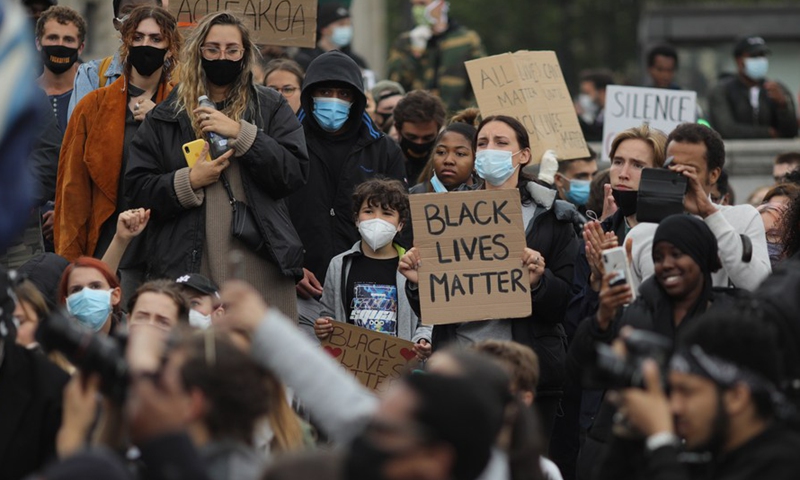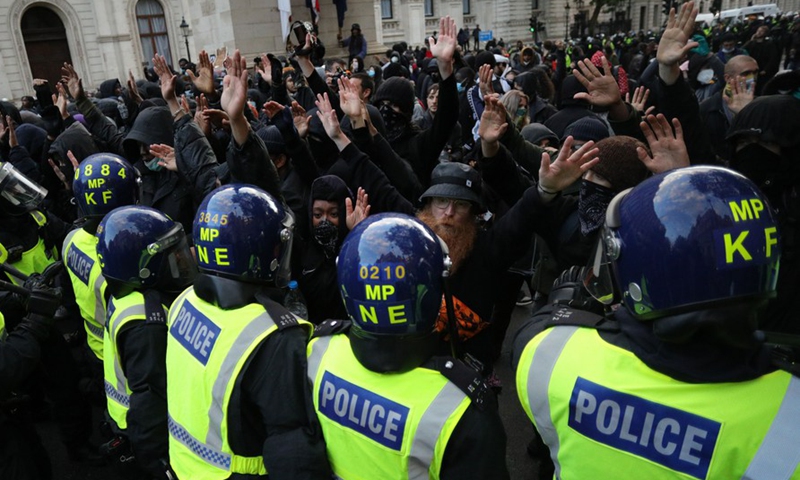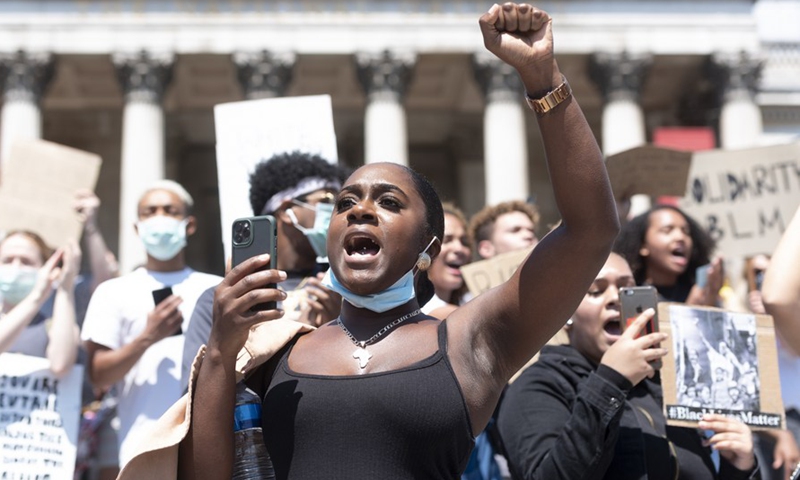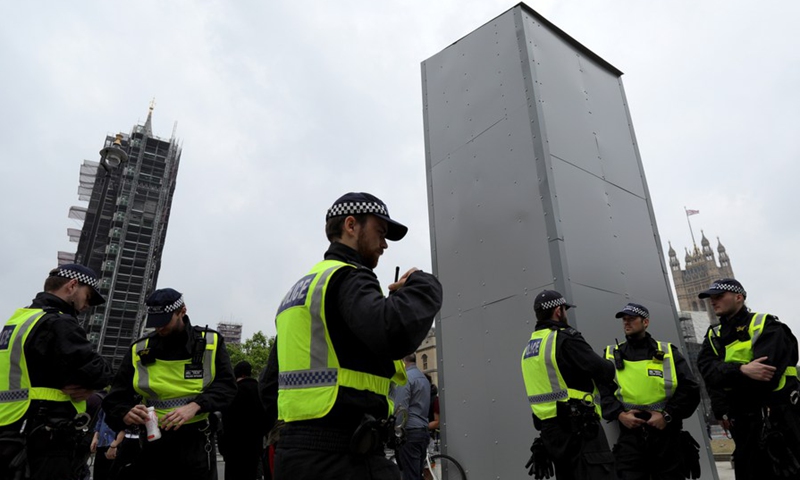Over 100 arrested in central London in violent protests against anti-racism
Source:Xinhua Published: 2020/6/14 13:51:36

Demonstrators take part in a protest in London, Britain, on June 12, 2020. (Photo by Tim Ireland/Xinhua)
Over 100 people were arrested during Saturday's far-right protests in central London, which turned violent later and left six police officers with minor injuries, Scotland Yard said.
A crowd of people, mainly white men, converged on Parliament Square, before moving to Trafalgar Square and other areas in central London on Saturday to "guard" statues as part of counter-protests against anti-racism demonstrations.
Around 200 protesters later broke the police curfew by remaining in the area past 17:00 p.m. local time (1600 GMT), most of whom congregated around the statue of Winston Churchill.
Among those gathered was Paul Golding, leader of the far-right group Britain First, who had called on supporters to descend on the British capital while claiming authorities had "allowed vandalism against national monuments."

Demonstrators hold up their hands in front of a police line on Whitehall during a Black Lives Matter protest in London, Britain on June 6, 2020. (Photo by Tim Ireland/Xinhua)
The protests then turned violent, with demonstrators pelting bottles and at least one smoke bomb at police officers on foot and on horseback. Chants of "England" rang out around the Whitehall road as many of those present were drinking.
Six police officers and at least 13 other members of the public were injured during the protests, and six of them were taken to hospital, the ambulance service said.
As of 21:00 p.m. local time, at least 100 were arrested for offenses including violent disorder, assaulting police officers, possession of an offensive weapon, possession of class A drugs, being drunk and disorderly and breach of the peace, Scotland Yard said.
"Millions of Londoners will have been disgusted by the shameful scenes of violence, desecration and racism displayed by the right-wing extremists who gathered in our city today," London Mayor Sadiq Khan wrote on Twitter following the protests.
"In the face of attacks and abuse, our police did a fantastic job to control the situation. Thank you," he wrote.
Prime Minister Boris Johnson also condemned the violence on Twitter, posting, "Racist thuggery has no place on our streets. Anyone attacking the police will be met with full force of the law."
"These marches and protests have been subverted by violence and breach current guidelines. Racism has no part in the UK and we must work together to make that a reality," he wrote.

People take part in a protest over the death of George Floyd at Trafalgar Square in London, Britain, on May 31, 2020. (Xinhua)
"Any perpetrators of violence or vandalism should expect to face the full force of the law," Home Secretary Priti Patel wrote on Twitter, calling the violence "unacceptable thuggery."
"Violence towards our police officers will not be tolerated. Coronavirus remains a threat to us all. Go home to stop the spread of this virus & save lives," she wrote.
Meanwhile, Shadow Home Secretary Nick Thomas-Symonds joined the condemnation, saying the protesters seemed "intent on causing violence and division."
The latest far-right protests took place after a series of anti-racism demonstrations across the country, sparked by the death of African American man George Floyd on May 25 in the US city of Minneapolis.
Floyd, 46, died after a white US police officer knelt on his neck for almost nine minutes until he stopped breathing. In a video footage, Floyd was heard saying "I can't breathe" while three other police officers stood by.

Police officers stand guard next to a protective box installed around the statue of Winston Churchill during a protest in London, Britain, on June 12, 2020. (Photo by Tim Ireland/Xinhua)
Last weekend, anti-racism protesters in London defaced the statue of Churchill in Parliament Square in central London, and toppled a statue of 17th-century slave trader Edward Colston in the southern British city of Bristol. They had also arranged further protests this weekend, prompting statues to be boxed up.
In response, Mayor Khan said Friday that key statues and monuments in London, including the Cenotaph in Whitehall, statues of Churchill and Nelson Mandela, are to be covered and protected.
Anthony Glees, former director of the University of Buckingham's Center for Security and Intelligence Studies, told Xinhua in a recent interview that he was not surprised the anger over Floyd's killing spread across the Atlantic to Britain.
"My sense is black people in Britain share the anxieties and resentments felt by American black people, and associate with them very strongly," Glees said.
"The murder of George Floyd has visibly awakened many people," Brussels Times newspaper quoted Ange Kazi, spokesperson of the Belgian Network for Black Lives Matter, which called for the protest, as saying.
"Many people are fed up with police violence, which systematically affects Blacks," she said.
Posted in: EUROPE